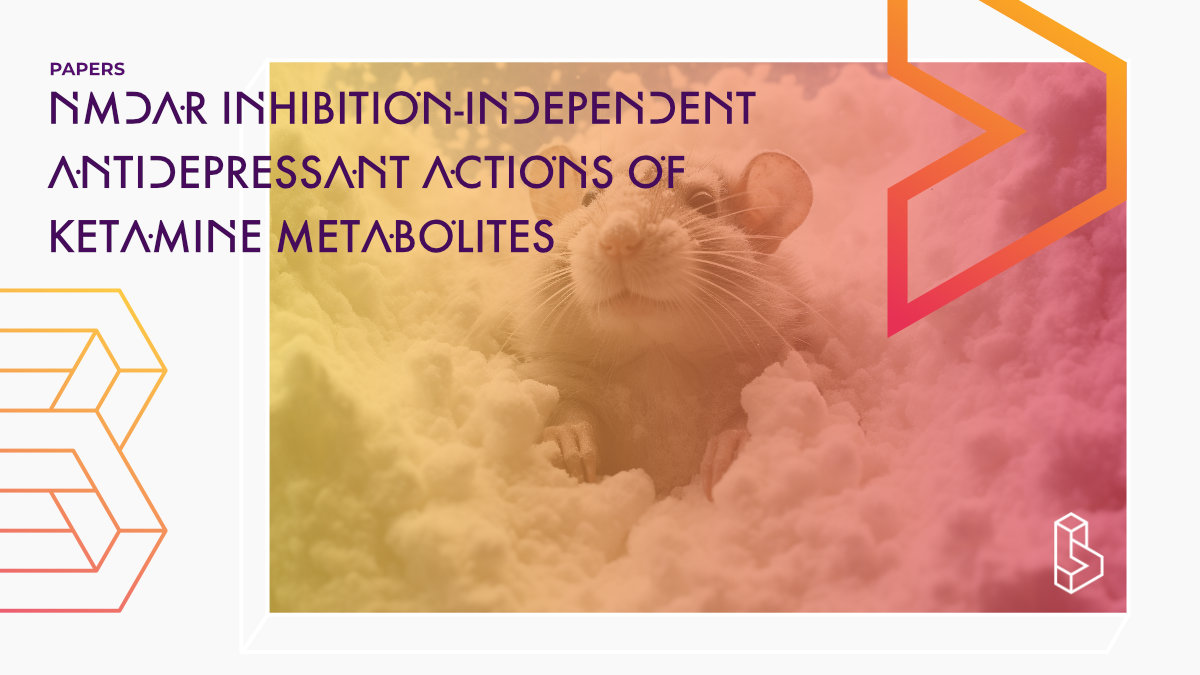This review (2106) explores findings from rodent studies that examined whether a ketamine-metabolite (HNK) with fewer side effects is sufficient to induce antidepressant effects using a range of measurement techniques. Results indicated that the metabolite could exert antidepressant effects through early activation of glutaminergic AMPA receptors, independent of NMDA receptor inhibition typically induced by ketamine.
Abstract of NMDAR inhibition-independent antidepressant actions of ketamine metabolites
“Introduction: Major depressive disorder afflicts ~16 per cent of the world population at some point in their lives. Despite a number of available monoaminergic-based antidepressants, most patients require many weeks, if not months, to respond to these treatments, and many patients never attain sustained remission of their symptoms. The non-competitive glutamatergic N-methyl-D-aspartate receptor (NMDAR) antagonist, (R,S)-ketamine (ketamine), exerts rapid and sustained antidepressant effects following a single dose in depressed patients.
Methods: Here we show that the metabolism of ketamine to (2S,6S;2R,6R)-hydroxynorketamine (HNK) is essential for its antidepressant effects and that the (2R,6R)-HNK enantiomer exerts behavioural, electroencephalographic, electrophysiological and cellular antidepressant actions in vivo.
Results: Notably, we demonstrate that these antidepressant actions are NMDAR inhibition-independent but they involve early and sustained α-amino-3-hydroxy-5-methyl-4-isoxazole propionic acid (AMPA) receptor activation. We also establish that (2R,6R)-HNK lacks ketamine-related side effects. Our results indicate a novel mechanism underlying ketamine’s unique antidepressant properties, which involves the required activity of a distinct metabolite and is independent of NMDAR inhibition.
Discussion: These findings have relevance for the development of next-generation, rapid-acting antidepressants.”
Authors: Panos Zanos, Ruin Moaddel, Patrick J. Morris, Polymnia Georgiou, Jonathan Fischell, Greg I. Elmer, Manickavasagom Alkondon, Peixiong Yuan, Heather J. Pribut, Nagendra S. Singh, Katina S. S. Dossou, Yuhong Fang, Xi-Ping Huang, Cheryl L. Mayo, Irving W. Wainer, Edson X. Albuquerque, Scott M. Thompson, Craig J. Thomas, Carlos A. Zarate Jr. & Todd D. Gould
Summary of NMDAR inhibition-independent antidepressant actions of ketamine metabolites
Major depressive disorder is common and associated with serious health and socioeconomic consequences. Ketamine, a non-competitive, glutamatergic NMDAR antagonist, has demonstrated rapid and robust efficacy as an antidepressant, but its potential for widespread clinical use is limited owing to its abuse liability and capacity to produce dissociative effects.
Find this paper
NMDAR inhibition-independent antidepressant actions of ketamine metabolites
https://doi.org/10.1038/nature17998
Open Access | Google Scholar | Backup | 🕊
Cite this paper (APA)
Zanos, P., Moaddel, R., Morris, P. J., Georgiou, P., Fischell, J., Elmer, G. I., ... & Gould, T. D. (2016). NMDAR inhibition-independent antidepressant actions of ketamine metabolites. Nature, 533(7604), 481-486.
Study details
Compounds studied
Ketamine
Topics studied
Neuroscience
Depression
Study characteristics
Animal Study

